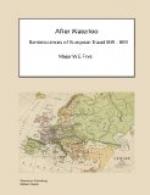I recollect that in the History of the Compere Mathiew[21] the Pere Jean rates mightily the natives of Cologne for their bigotry and superstition and for the bad reception they gave to him and to his philosophy. That people are happier from a blind belief, as some pretend, appears to me extremely problematical. For my part, under no circumstances can I think bliss to consist in ignorance; nor have I felt any particular discomfort in having learned at a very early age to put under my feet, as Lucretius expresses it, the strepitum Acherontis avari. On the contrary, it has made me a perfect cosmopolitan, extinguished all absurd national and religious prejudices, and rendered me at home wherever I travel; and I meet the Catholic, the Lutheran, the Moslem, the Jew, the Hindou and the Guebre as a brother. Quo me cunque ferat tempestas, deferor hospes.[22] Let me add one word more to obviate any misrepresentation of my sentiments from some malignant Pharisee, that tho’ I am no friend to King-craft and Priest-craft, and cannot endure that religion should ever be blended with politics, yet I am a great admirer of the beautiful and consoling philosophy or theosophy of Jesus Christ which inculcates the equality of Mankind, and represents the Creator of the universe, the Author of all being, as the universal Father of the human race.
Cologne derives its name from Colonia, as it was a Roman Colony planted here to protect the left bank of the Rhine from the incursions of the German hordes. It is here that the grand and original manufactory of the far-famed Eau de Cologne is to be seen. The Eau de Cologne is a sovereign remedy for all kinds of disorders, and if the affiches of the proprietor, Jean-Marie Farina, be worthy of credit, he is as formidable a check to old Pluto as ever Aesculapius was. The sale of this water is immense.




